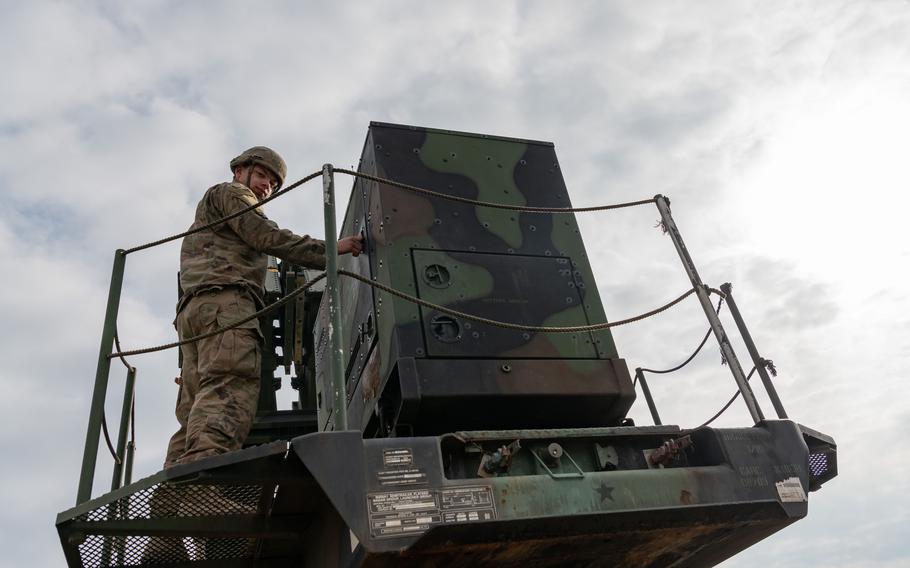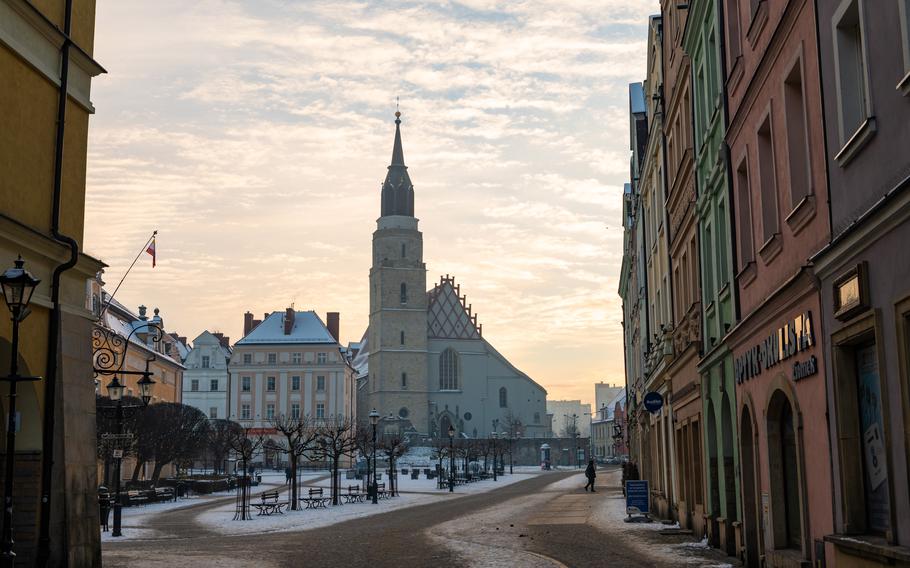
Pfc. Jacob Root inspects a Patriot missile launching station in southeast Poland at the beginning of his shift March 7, 2023. Poland is a strategically important partner in the West’s confrontation with Russia. (Phillip Walter Wellman/Stars and Stripes)
Poland’s parliamentary election on Sunday is being billed as the most consequential in years, with potential ramifications for Europe, the war in Ukraine and democracy itself.
The leaders of the two main parties have a deep-seated hatred of each other, and the campaigns have been vicious and often personal. A maverick far-right party whose leader is a former TikTok star may swing the results.
Who is the favorite to win? It’s too close to call. But here’s what to know about Europe’s most-watched election of the year.

The town square of Boleslawiec, Poland, photographed on Dec. 14, 2022. (Phillip Walter Wellman/Stars and Stripes)
What’s at stake in Poland’s election?
The rhetoric around this election is often framed in existential terms, with voters not only deciding on specific issues — migration, abortion, the economy — but also what kind of country Poland wants to be.
If the ruling Law and Justice party, a right-wing populist group also known as PiS, wins a third term, expect the continuation of the party’s socially conservative agenda and more rule-of-law standoffs between Warsaw and the European Union leadership in Brussels. If opposition parties are able to seize control, they have pledged to reverse some of the restrictions placed on abortion and LGBT rights and to reinstate the independence of the courts and media.
“The major issue at stake is whether a major country in Europe is going to stay on the path of becoming less democratic in character, or if it turns back from that,” said Ben Stanley, a politics expert at SWPS University in Warsaw.
“There are very few independent institutions now that have the possibility to control what the executive in Poland is doing.”
This election is also being watched by the West for consequences for neighboring Ukraine.
Poland has taken in millions of refugees, helped with aid and campaigned for Ukraine to join NATO and the E.U. Polish support has begun to waiver, though, as the interests of farmers in the east clashed with Ukraine’s need to sell its grain abroad.
Who are the leading candidates in Poland’s election?
The contest is dominated by two big beasts of Polish politics.
Jaroslaw Kaczynski is the leader of the Law and Justice party. He founded the party with his twin brother and served as prime minister from 2006 to 2007, while his brother was president. During the party’s more recent turn in power, he yielded the top jobs to more moderate figures — though he was still recognized as Poland’s most powerful politician.
The main opposition group is the center-right Civic Platform, led by Donald Tusk, who served as Poland’s prime minister from 2007 to 2014. Tusk is also a former president of the European Council and in that role worked with country leaders to define the direction of the E.U. and navigate Brexit.
PiS was ahead in the final opinion polls, but an outright majority looks unlikely, meaning the smaller parities could make all the difference. Confederation, a hard-right economically libertarian party, is one such party.
It’s led by Slawomir Mentzen, a former tax adviser and TikTok star, who previously described his supporters as those who “don’t want Jews, homosexuals, abortions, taxes and the European Union.”
The party has been critical about the merits of helping Ukraine, both in terms of military support and refugees. If it does become a kingmaker in the election, its leaders may insist on a less accommodating approach to Ukraine.

U.S. generals and diplomats along with Polish leaders were on hand during a ceremony in Poznan, Poland, where the Army formally established a new garrison on March 21, 2023. The election in Poland on Sunday is being watched for consequences for neighboring Ukraine. (John Vandiver/Stars and Stripes)
How are Ukraine and grain playing into Poland’s election?
Poland has been one of Ukraine’s biggest supporters, but relations between the countries soured following disputes over grain.
Ukraine is a major exporter of grain — it’s often referred to as the “bread basket of Europe.”
When Russia sought the pressure the country with a blockade, the E.U. offered support to Kyiv by opening its market. But Polish farmers say a glut of cheap Ukrainian grain has made it hard for them to make any profit from their own stocks.
Law and Justice has come to their defense, pumping out subsidies to Polish farmers, while extending an embargo on Ukrainian grain.
Some commentators say this was a way for the ruling party to better position itself among its supporters in rural areas and small towns where the economy is heavily dependent on agriculture.
How is Poland’s visa scandal playing into the election?
Reports in the independent Polish media estimate that as many as 250,000 migrants from Asia and Africa have been given fast-tracked work visas in exchange for cash. Several officials, including the deputy foreign minister, were fired for their role in the scandal. Seven people have been charged.
It’s a headache for Law and Justice, which rose to power on an anti-immigrant platform. But the scandal hasn’t got much play in the public media, which critics say is increasingly a PiS propaganda machine.
Why do Poland’s election results matter for Europe and beyond?
Poland is a strategically important partner in the West’s confrontation with Russia. More than 1.6 million Ukrainians have applied for temporary asylum in Poland, according to the U.N. refugee agency.
And Poland has been generous in military aid to Ukraine — albeit while getting new stocks from the United States to replace much of what it sends to the front lines.
The outcome of the election is also an important moment for the European project and what it says about autocratic governments, like that in Hungary, where the form of democracy is still there but the substance is being stripped away.
The contest is incredibly close, and it’s possible that neither of the main parties are able to form a coalition. In the event of a stalemate, Poles could be heading back to the polls.